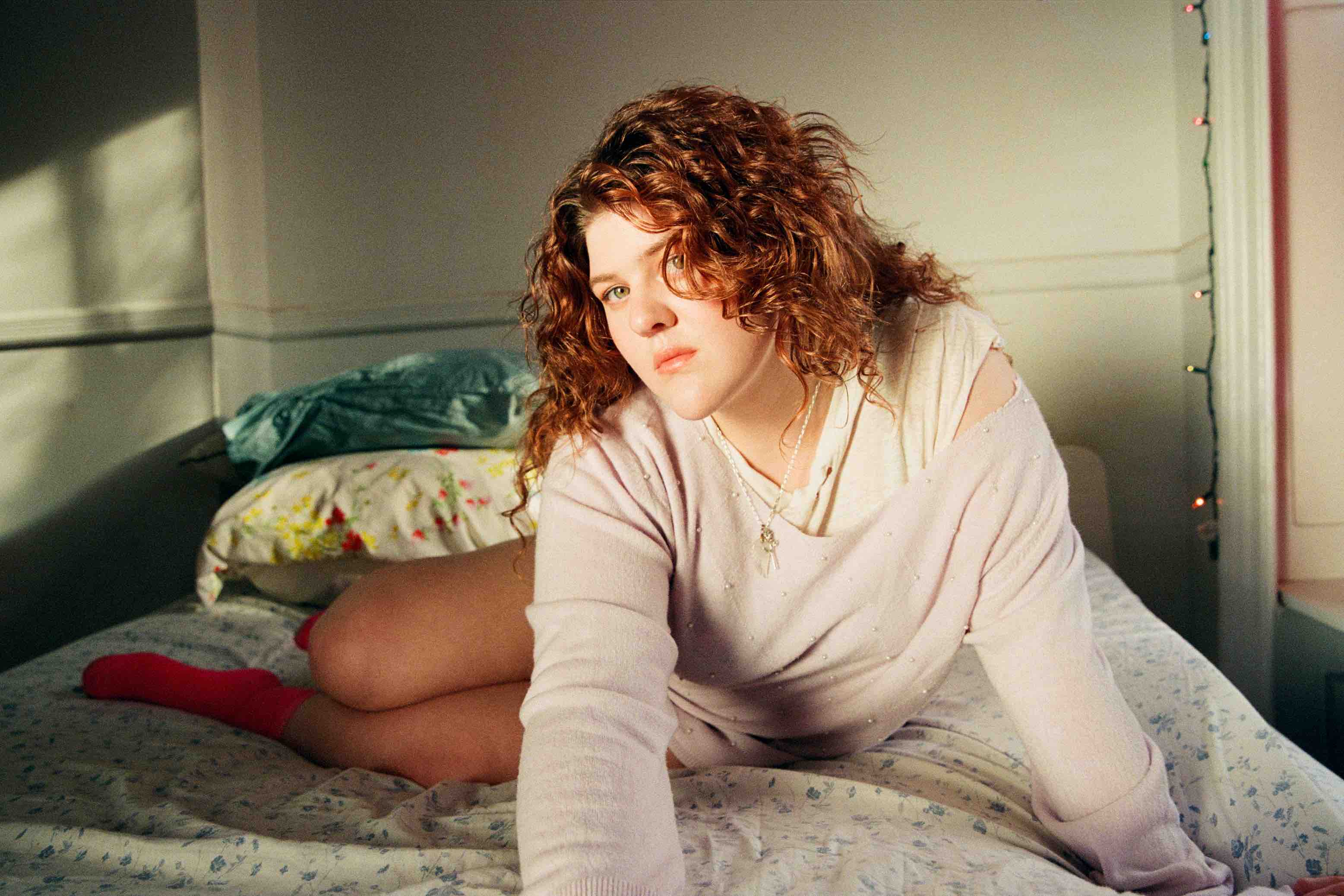Grace Ives is having fun despite the mess. The topics on her sophomore album Janky Star span from near-death experiences to hard drug dependency—yet Ives turns these dark reflections on their head with playful bursts of pop. Across the record her vocals transform from radiant halos akin to those of Enya, hold an irreverent charm like Kate Nash, and dip into the Kate Bush realm of art pop. As she performs these vocal acrobatics, her instrumentals nod to the propulsive cool of 2000s bloghouse and that era’s love of collage. “It’s so fun,” she beams, Zooming in from her Brooklyn home. “I felt that going to shows in college I always wanted to dance, and nobody ever danced. They can be singing about being so fucking lonely and you can still dance. It’s such a challenge to create a song that’s interesting and fun, but then leave the right amount of space to contradict that and give a second layer of feeling.”
Since her 2019 debut 2nd she’s pivoted toward conventional pop with an unconventional twist; her melodies will stick to your ears like bubblegum on a dirty pair of Converse. Ives' music is pop in the sense that it has that inexplicable catchiness which seems effortless, while she simultaneously peppers her tracks with affecting bits of honesty, creating a playpen for her sullen words to transcend. “I can be given the space to explore that sad or lonely feeling while being guided by a beat that’s uplifting. It’s really a fun challenge,” she says. “Lana Del Rey sings about some sad stuff; she’s very illustrative in her world that she curates lyrically, and it’s pretty dark. But the feeling that it gives, it's almost a relief where it’s like, ‘OK, my sadness doesn’t have to be so trapped and reclining and unable to move.’”
She talks about the challenge of imbuing her songs with honesty, something she’s become more open to in her writing, distilling true emotion against an infectious, fluttering background. “I dive into the full emotion when I’m singing and writing lyrically, but for the composition and the beat and the sonic world I’m like, ‘OK, pull it back, you,’” she laughs. “‘Don’t go too far into that darkness.’ The song ‘On the Ground,’ sonically, was so fun to make, but every time I went to sing it, me and my engineer would both just cry. Even though the lyrics are so vague—like singing ‘I want to feel proud’—it’s so sad, because that’s what we all kind of want to feel, and it’s so hard to feel proud sometimes, especially when you’re hard on yourself or you’re taught to be so hard on yourself for no reason.”
“It’s such a challenge to create a song that’s interesting and fun, but then leave the right amount of space to contradict that and give a second layer of feeling.”
Ives drew from her junior high influences for Janky Star, listening to late-2000s artists like Spank Rock, Santigold, Rye Rye, and even a little Vampire Weekend. She connected with co-producer Justin Raisen to help hammer out her sound, finessing these tracks into earworms that could have easily been a massive hit last decade. While in Ives’ mind the first renditions of these songs were finished, her label encouraged her to get a second opinion. “I didn't realize this at the time, but they did kind of need a little bit of oomph. They needed to be challenged a little bit.” She immediately clicked with Raisen, who’s worked with Sky Ferreira, Yves Tumor, and Charli XCX, trusting him to take her songs to another level without erasing her touch. “What was great about Justin is we speak the same language,” she explains. “I’m like, ‘I need a really sparkly sound, but I want it to be like it’s coming from the room behind you.’ We both talk in nonsense,” she laughs.
Working with Raisen also opened her eyes to using live instrumentation and manipulating it in the studio. “In the past I’ve limited myself by just using my 505 and my two synths that I have, opening Logic and not trying to create a new sound but putting my external sound into the computer recording it.” On “Shelly,” she sings about a bartender that caught her eye while working coat check at Brooklyn venue Baby’s All Right, referencing her striking resemblance to Shelly from Twin Peaks over a John Mellencamp–esque guitar. “Some sonic decisions I would turn my nose up at, like guitar or live instruments that, as a concept, sound so minimal and not-pop. I was surprised that you can make it work.”

In contrast to her debut, Ives wasn’t only challenged to spend more time with each song, but admits she’s becoming a more honest songwriter. “On 2nd, I used a lot of small metaphors for myself in order to create a distance between my actual person and the lyrics. On this album, I allowed myself to write more and actually describe feelings and experiences that are really personal to me, and that are relatable to people. Lyrics have always been a hard thing for me. I think I’ve let myself experience those moments of the words coming to me because I’ve been patient with myself and try to give myself the time to express something more than just like, ‘I’m a mansion,’ or ‘I’m a butterfly,’ or like ‘icing on the cake,’ you know?”
“I dive into the full emotion when I’m singing and writing lyrically, but for the composition and the beat and the sonic world I’m like, ‘OK, pull it back, you. Don’t go too far into that darkness.’”
Janky Star captures the past couple years of Ives’ life, which she describes as a story of “living in a shitty apartment,” “kind of losing [her] mind a little bit,” and the thrill and anxiety of landing a record deal. With that flexed muscle of honesty came the beginnings of acceptance. Throughout the record, whether she’s talking about a depressive, repetitive funk on “Lazy Day” or the uncomfortable expectations of the music industry on “Burn Bridges” and “Angel of Business,” these songs glisten with resolve. “I let go of this feeling of trying so hard to sound cool and to force myself to sound like a persona,” she explains. “It’s much cooler to let myself say the things that I actually would say, and that I would want to hear. I want to be proud of myself. And something that makes me proud of myself is actually articulating a feeling.”
Whereas 2nd relied heavily on metaphors to express feelings, she’s let her guard down to get to the heart of her emotions on Janky Star. “[I was] stopping myself short, being afraid that I’m not going to be able to articulate that feeling so I might as well stick with the dumbed-down easy version of it. It’s not as embarrassing as I always thought it would be to be honest and vulnerable. In the past, it’s been kind of cringy to think about talking to you about myself and my sadness and my joy and whatever. Coming to terms with the cringe.”
There’s a parallel between acknowledging the shittiness of the industry while feeling more comfortable in her truth. She’s not a token of flamboyance for executives to gawk at. “The experience of entering this bigger world of the music industry definitely shaped my writing of the songs,” she explains. “‘Burn Bridges’ does a good job of describing that uncomfortable feeling of being put in these rooms with all these people who kind of want you to get up on the table and start being an artist and talk about things like seeing colors. I’m just like, ‘I’m a normal person,’ you know? It’s hard to live up to the expectation of being an artist when I’m not so extravagant.”
“I let go of this feeling of trying so hard to sound cool and to force myself to sound like a persona. It’s much cooler to let myself say the things that I actually would say, and that I would want to hear.”
Janky Star is as much about Ives coming into her own sound as it is about the frightening beginnings of entering the music industry machine. After signing a three-album deal, she experienced doubt. Songs like “Angel of Business” address this anxiety while also placing it into the hands of a higher power. The hardest part is that her new position goes far beyond just making music. “It’s like working in marketing. Like a social media intern is how I feel,” she admits. “It’s hard to enter into a space where it’s not all about the music. When I’ve had my really down days of having to make some kind of promotional material, my brain doesn’t really think like that. Unfortunately, the way that it is right now in the music industry is you have to be willing to play a little bit with doing your own self-promotion in cringy ways.”
But there’s acceptance in admitting the ugliness of capitalistic pressures: “That’s why people in the music industry got into music—because they love music, and they want it to be all about the music…we all have to do our part to get everybody to listen to the music and it’s hard these days.” FL









